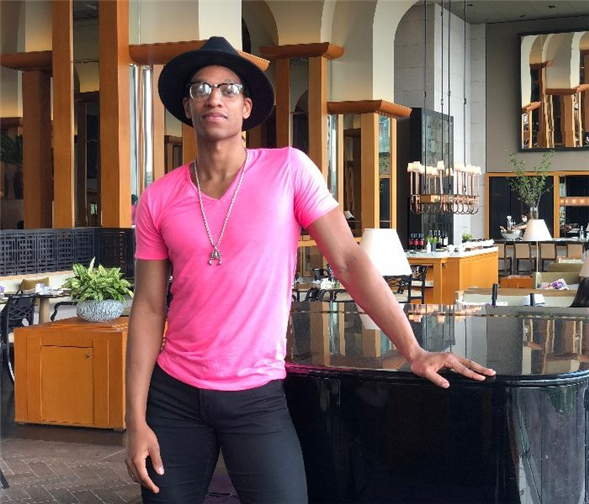Translate Page

As one of the only African-American performers currently working in professional theatre, Marcus Williams has a unique perspective on the twin pandemics of coronavirus and racism
Since the pandemic hit the US, Marcus Williams has been in exile, performing as a member of The Phantom of the Opera's international tour. The show just wrapped up a six-month engagement in Seoul and is about to open in Daegu, South Korea, making it one of the few professional productions playing to audiences indoors in the world. Williams realizes he's lucky to be working in theatre right now. However, as the only African-American member of the 125-person company and crew, it's been stressful. Watching the murder of George Floyd without the comfort of his family or the ability to join friends in protest, he has experienced rage, grief and even more anxiety than living through lockdown.
South Korea's aggressive response to the global health crisis has made it the country to emulate, especially when it comes to theatre. After COVID-19 cases were reported in the Phantom cast, the show went on hiatus for 15 days. Everyone involved in the production quarantined, and the show reopened with stringent safety precautions such as disinfectant mist, temperature checks and a contact-tracing app.
But while Williams felt physically safe, he had to take time off during the peak of the protests to deal with his anxiety. Though he acknowledges his colleagues have been supportive, they cannot understand what it is like for him as an African-American man to watch the Black Lives Matter movement from afar. He feels particularly guilty that his family is in Dallas, Texas, where the virus is surging. Though he checks in with them frequently via Zoom, he longs to be with them in person—even in a mask and at a distance.
"It's like a split of two minds," Williams says. "I'm trying to stay in the moment and be thankful that I'm here, but my life is in the US and it's not looking so great from where I am."
As the sole Black American in Phantom (there are two other Black cast members from Africa), Williams has found himself fielding questions from his coworkers about what can be done to fix racism, which seems akin to a person in a speedboat yelling to a drowning person, "What can I do to save you?" But Williams says he is constantly educating himself so that he has "a clear understanding of how to respond in a way that seems suitable and appropriate." Still, the expectation that he carry the emotional burden for others, do the research online and process their feelings—even as he is dealing with his own intense emotions—has been a tall order.
"People who ask those things don't mean any disrespect," he says. "But everyone has a phone; you should be as helpful to yourself as you can because we [Black people] don't have much to give right now."
Coming from concert dance, where Black artists have successfully established their own powerful institutions, Williams is new to the racism entrenched in the predominantly white theatre industry. He launched his career at the Debbie Allen Dance Academy, where he studied as a scholarship student after graduating high school. Two years later he started at The Ailey School and was eventually accepted into Ailey II, Alvin Ailey American Dance Theater's second troupe.
In 2019, he began auditioning for other projects and landed a spot as a dancer in Phantom's international tour. Williams was scheduled to fly to South Korea in January, just as COVID-19 started to spike in the country. Initially, he had second thoughts. "The night before I left, my anxiety hit," he recalls. "I kept thinking, what if I get stuck?" Ultimately, he boarded the plane, learned the show in three weeks and then returned briefly to the US to be with his family.
By the time he returned to South Korea in March, the situation was reversed: the US was spiraling while South Korea had the virus under control. Williams has been appearing in Phantom six days a week while his peers back home have been filing for unemployment.
Putting on fabulous costumes every night and sharing the role of the Slave Master is a dream come true for Williams, but being unable to return home to see his family and march for racial justice has soured that feeling. He had to cancel his planned July vacation; he won't return stateside until after the show's Daegu engagement ends on September 28. In the interim, Williams continues to sign petitions, choreograph powerful dances and wear his hair out "in a 'fro, and I do that very proudly."
Being outside the US, Williams only recently learned about the We See You White American Theatre movement and list of demands. While he hasn't read the document thoroughly, he agrees with the sentiment that change "definitely has to come from the top," and he points to Black choreographers such as Alvin Ailey, Donald McKayle, Ann M. Williams and Joan Myers Brown who founded their own companies and transformed the concert dance world.
"The people who started these Black legacies made a name for themselves from the top", he says. If Black artistic directors and producers are given an opportunity to break through in the theatre industry, the cultural landscape of Broadway and beyond will shift and, eventually, look as diverse as dance in America. Williams hopes that by the time the pandemic subsides in the US, some of those changes will be starting to take shape.
---
A dancer, teacher and playwright, Juan Michael Porter II has contributed articles to Observer, TheBody, American Theatre, Time Out New York, Electric Literature, BroadwayWorld and HuffPost. Follow him at @juanmichaelii. Follow TDF at @ TDFNYC.
Top image: Marcus Williams. Photos courtesy of Marcus Williams.